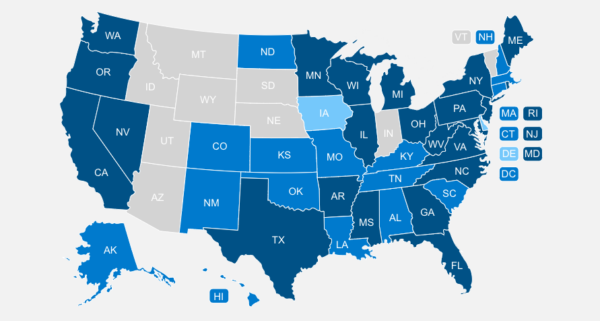
How to Start a Nonprofit in Kentucky: A Step-by-Step Guide for Beginners
August 26, 2025
How to Start a Nonprofit in Maine: A Step-by-Step Guide
August 26, 2025How to Start a Nonprofit in Louisiana: A Step-by-Step Guide for Beginners

Starting a nonprofit in Louisiana might seem overwhelming at first. After all, there’s paperwork to file, regulations to follow, and important decisions to make about your organization’s structure. However, with the right guidance and support from experienced partners like Labyrinth, Inc., you can transform your vision into reality. At Labyrinth, our Nonprofit Compliance Specialists—each with 15+ years of nonprofit leadership experience—provide 1-on-1 support through every step of your formation. We handle your nonprofit’s registrations from incorporation through IRS approval, backed by our 100% money-back guarantee on 501(c)(3) approval.
The good news? You don’t need to be a legal expert or have previous nonprofit experience to get started. Whether you’re passionate about education, healthcare, environmental conservation, or community development, this comprehensive guide will walk you through every step of establishing your nonprofit in Louisiana.
Ready to make a lasting impact on your community? Let’s break down the process into simple, manageable steps and get your nonprofit up and running!
Planning Your Louisiana Nonprofit
Before launching your nonprofit in Louisiana, thorough planning sets the foundation for long-term success. A well-structured plan ensures your organization stays focused on its core mission while effectively serving the community.
Define your nonprofit’s mission
The mission statement forms the cornerstone of your nonprofit, explaining your organization’s purpose in one or two clear sentences. An effective mission statement answers three key questions:
- What community needs does your organization address?
- Who are the people you serve?
- How does your organization solve these needs?
Your mission statement should be concise, operational, and motivational. Additionally, create a vision statement that paints a picture of the positive change your organization aims to achieve. While the mission defines your current purpose, the vision illustrates the ambitious future state you’re working toward.
Research similar organizations
Prior to establishing your nonprofit, conduct thorough research to identify organizations doing similar work in your community. This step serves multiple purposes:
- Prevents duplication of services
- Identifies potential collaboration opportunities
- Helps refine your unique approach
- Validates the need for your services
Consider partnering with existing organizations rather than starting from scratch. This approach often leads to more efficient use of resources and greater community impact. Furthermore, understanding the nonprofit landscape helps position your organization effectively within your chosen subsector, which becomes crucial when reporting to the IRS.
Create a startup budget
A comprehensive startup budget ensures your nonprofit’s financial sustainability. When developing your budget, focus on the essential filing and formation costs:
Formation and Filing Fees:
- Louisiana Articles of Incorporation: $80 (including processing fee)
- IRS Form 1023-EZ: $275
- IRS Form 1023: $600
- Estimated founder time: 20-30 hours for document preparation
Beyond these core formation expenses, you’ll need to account for various operational costs including administrative expenses, program funding, and marketing efforts. Set clear financial goals and create detailed projections for your first year of operation. Remember to include both one-time startup costs and recurring operational expenses.
For professional guidance on structuring your nonprofit’s finances and ensuring compliance with Louisiana’s specific regulations, consider working with experienced partners like Labyrinth. Their expertise helps navigate the complexities of nonprofit financial management while you track progress through their secure SOC 2 Type II client portal.
Keep your budget flexible enough to accommodate unexpected changes while maintaining focus on your core mission. Regular budget reviews and adjustments help ensure your organization stays financially healthy while effectively serving its intended purpose.
Choose Your Nonprofit Structure
Selecting the right nonprofit structure shapes your organization’s legal framework and operational capabilities. Louisiana offers specific nonprofit categories, each designed to serve different purposes and communities.
Types of nonprofits in Louisiana
Louisiana requires charitable organizations to register under one of four corporation structures:
- Public Benefit Corporation: These organizations focus on serving the broader community and public good. Public benefit corporations often qualify for tax-exempt status and operate programs that benefit society at large.
- Mutual Benefit Corporation: These organizations primarily serve their members’ interests. Examples include:
- Social clubs
- Fraternal organizations
- Homeowners’ associations
- Religious Corporation: Specifically established for religious purposes, these organizations manage places of worship such as churches, mosques, and temples.
- Mutual Benefit Common Interest Development Corporations: These entities manage common interest developments, including condominiums and homeowners’ associations.
Board member requirements
Louisiana maintains specific requirements for nonprofit board composition and governance. Here are the essential board member requirements:
Minimum Board Size
- Three initial directors minimum
- While Louisiana law permits fewer directors for membership nonprofits with one or two members, we recommend maintaining three directors to meet IRS requirements for 501(c)(3) organizations
Board Responsibilities
- Set organizational rules and policies
- Meet at least three times annually according to Louisiana law
- Create an executive committee consisting of chairman and vice chairman according to Louisiana law
- Adopt comprehensive bylaws
- Manage organizational affairs
- Ensure proper financial oversight
Legal Duties
Board members must fulfill three primary fiduciary duties:
- Duty of Care: Exercise good judgment and diligence in organizational decisions
- Duty of Loyalty: Put the organization’s interests ahead of personal gain
- Duty of Obedience: Ensure compliance with laws and mission objectives
Term Limits and Structure
- Default term: One year with possibility of re-election
- Maximum single term: Five years
- No residency requirements unless specified in bylaws
Operational Guidelines
- Majority of board members constitute a quorum
- Board can establish committees with minimum two directors
- Directors may receive reasonable compensation for services
For expert guidance on structuring your nonprofit board and ensuring compliance with Louisiana regulations, consider consulting with Labyrinth. Our Nonprofit Compliance Specialists understand Louisiana’s unique requirements and help establish strong governance foundations that support your mission while maintaining full legal compliance.
Remember, your board structure significantly influences your organization’s effectiveness and ability to fulfill its mission. Subsequently, choosing qualified directors who understand their legal obligations and share your vision becomes crucial for long-term success.
Register Your Organization
Registering your nonprofit organization in Louisiana involves several crucial steps that establish your legal foundation. Let’s explore the essential requirements and procedures for making your nonprofit official.
Pick an available name
The first step toward establishing your nonprofit involves selecting a distinctive name. Through Louisiana’s Business Filings Search tool, verify your desired name’s availability. Consider these naming guidelines:
- The name must be expressed in English letters or characters
- Avoid words suggesting government agency affiliation
- Steer clear of terms like “bank,” “insurance,” or “engineering” without proper approval
- Ensure the name doesn’t conflict with existing trademarks
Once you’ve chosen a name, you can reserve it for 60 days. Moreover, two 30-day extensions are possible with proper justification.
File Articles of Incorporation
Filing your Articles of Incorporation officially establishes your nonprofit in Louisiana. The process requires:
Required Documentation:
- Completed Articles of Incorporation form
- Registered agent’s affidavit
- Agent acknowledgment and acceptance
Filing Details:
- Standard filing fee: $75.00 plus $5.00 credit card processing fee as per Louisiana Secretary of State filing instructions
- Processing time: Approximately one week for standard processing
- Filing methods: Online through CORA, mail, fax, or in-person using the Louisiana Articles of Incorporation form.
For organizations in parishes like Ascension, Bossier, Caddo, Calcasieu, East Baton Rouge, Jefferson, Lafayette, Livingston, Orleans, Ouachita, Rapides, St. Tammany, Tangipahoa, and Terrebonne, online filing through geauxBIZ is mandatory.
Critically, your Articles of Incorporation must include specific IRS-approved language to qualify for 501(c)(3) status. This includes a proper purpose clause stating your exempt purposes and a dissolution clause ensuring assets transfer to another 501(c)(3) organization upon dissolution. Without this exact language, the IRS will require costly amendments before approving your tax exemption.
Labyrinth offers expert guidance throughout this process, ensuring your documentation meets all state requirements. We draft your Articles of Incorporation with the precise language required for IRS approval, and in Louisiana, we provide drop-off service at state offices for faster processing where available.
Get your EIN number
After your nonprofit is legally formed in Louisiana, obtaining an Employer Identification Number (EIN) becomes your next critical step. This nine-digit identifier serves as your nonprofit’s federal tax ID and is essential for:
- Opening bank accounts
- Hiring employees
- Filing tax returns
- Applying for tax-exempt status
Application Process:
- Wait until your organization is legally formed
- Apply through the IRS website, fax, or mail
- Receive your EIN immediately if applying online, as detailed in IRS guidelines on EIN acquisition.
Important Considerations:
- No fee required for EIN application, according to IRS information on obtaining an EIN.
- Online applications require a valid Social Security Number
- International applicants must apply by phone
- Print your EIN confirmation immediately upon receipt
Labyrinth includes EIN acquisition as part of our comprehensive formation service, handling the application at the optimal time in your formation process. This timing is crucial—applying too early might trigger automatic revocation risks IRS guidelines on EIN acquisition.
Remember, your Articles of Incorporation must include specific provisions if you plan to apply for tax-exempt status. The IRS may require amendments if these provisions are missing, as highlighted in Louisiana Secretary of State filing instructions. Therefore, working with experienced professionals who understand these requirements proves invaluable for avoiding future complications and costly amendments.
Apply for Tax Exemption
Securing tax exemptions marks a crucial milestone in establishing your Louisiana nonprofit. Understanding the distinction between formation and tax exemption is critical: filing Articles of Incorporation with Louisiana creates your nonprofit corporation, but this alone does not grant tax-exempt status or make donations tax-deductible. You must separately apply to the IRS for federal recognition, then pursue state exemptions.
Federal 501(c)(3) application
The IRS offers two pathways for obtaining federal tax-exempt status:
Form 1023-EZ Application:
- Available for organizations expecting under $50,000 in annual revenue for first three years
- Filing fee: $275
- Streamlined application process
- Requires completion of eligibility worksheet
Standard Form 1023:
- Required for larger organizations
- Filing fee: $600
- More detailed documentation needed
- Processing time up to six months
Labyrinth specializes in preparing both 1023 and 1023-EZ applications, with our team of Nonprofit Compliance Specialists ensuring accurate completion and timely submission. We handle all IRS correspondence during the application process and provide a 100% money-back guarantee on 501(c)(3) approval—giving you confidence to move forward with your nonprofit’s mission.
Louisiana state tax exemption
Upon receiving your federal determination letter, obtaining state tax exemptions becomes straightforward. Louisiana does not automatically grant state tax exemptions based on federal status—you must file separately with state agencies. The process involves:
Income Tax Exemption:
- Submit IRS determination letter to Louisiana Department of Revenue (revenue.louisiana.gov)
- No filing fee required
- Send to:
- Louisiana Department of Revenue
- P.O. Box 201
- Baton Rouge, LA 70821
Franchise Tax Exemption:
- File Form CIFT-620
- Submit to Office Audit Division
- Reference Revised Statute RS 47:608 for eligibility
Labyrinth assists organizations in navigating these requirements effectively, ensuring all state exemption applications are filed correctly following your federal approval.
Sales tax considerations
As of 2025, Louisiana maintains specific sales tax provisions for nonprofits:
General Guidelines:
- Most nonprofits do not receive blanket sales tax exemptions
- Exemptions available for specific fundraising activities
- Form R-1048 required for event-specific exemptions
Recent Updates:
- Department of Revenue continues recognizing certain nonprofit exemptions through 2025
- Applies to:
- Nonprofit organization sales
- Educational institution athletic/entertainment events
Fundraising Event Exemptions:
- Submit Form R-1048 at least two weeks before event
- No filing fee
- Contact Department of Revenue at (225) 219-7462 for guidance
Documentation Requirements:
- Maintain detailed records of exempt transactions
- Regular filing of required reports
- Compliance with state reporting deadlines
Important Considerations:
- Local tax administrators may recognize same exemptions
- Technical oversights being addressed through legislative process
- Exemptions remain effective throughout 2025
For ongoing compliance, establish proper accounting systems to track tax obligations. Regular reviews ensure continued eligibility for exemptions while maintaining accurate financial records. Remember that tax requirements often change, necessitating periodic updates to your organization’s procedures.
Set Up Your Operations
Once your nonprofit’s legal framework is established, setting up robust operational systems ensures smooth day-to-day functioning. A well-organized operational structure supports your mission while maintaining transparency and accountability.
Open a bank account
Opening a dedicated bank account marks a critical step in separating personal and organizational finances. To open your nonprofit’s bank account, gather these essential documents:
- Articles of Incorporation
- Executed nonprofit bylaws
- Employer Identification Number (EIN)
- Board resolution authorizing account opening
Account Management Best Practices:
- Assign dual signature authority to minimize risk
- Choose a bank offering nonprofit-specific benefits
- Consider credit unions for lower fees
- Maintain separate accounts for different funding sources
Create essential policies
Establishing clear policies protects your organization and guides decision-making. Labyrinth’s Nonprofit Compliance Specialists recommend developing these fundamental policies based on our 15+ years of nonprofit leadership experience:
Board Governance Policies:
- Meeting frequency and procedures
- Committee structures
- Decision-making protocols
- Conflict resolution processes
Financial Management Policies:
- Budget approval procedures
- Expense authorization limits
- Investment guidelines
- Financial reporting requirements
Operational Guidelines:
- Staff roles and responsibilities
- Volunteer management procedures
- Program evaluation methods
- Risk management strategies
Set up accounting systems
Implementing proper accounting systems ensures financial transparency and compliance. We suggest focusing on these key areas:
Chart of Accounts Structure:
- Create categories for assets, liabilities, revenues, and expenses
- Establish separate tracking for restricted and unrestricted funds
- Design coding systems for different programs and grants
- Set up donation tracking mechanisms
Internal Controls:
- Separate duties among different staff members
- Implement transaction approval protocols
- Establish regular reconciliation processes
- Schedule periodic financial audits
Software Selection:
- Choose nonprofit-specific accounting software
- Look for features supporting fund accounting
- Ensure grant management capabilities
- Select systems offering detailed financial reporting
Donation Management:
- Track individual contributions meticulously
- Monitor grant expenditures separately
- Document fundraising expenses
- Maintain detailed allocation records
Remember to store all organizational documents securely—these records prove essential for maintaining tax-exempt status and demonstrating proper governance. Your secure client portal with Labyrinth provides a centralized location for all formation documents, making compliance tracking simple. Regular reviews and updates of these systems help ensure continued effectiveness and compliance with changing regulations.
Ongoing Compliance Requirements
Maintaining your Louisiana nonprofit’s good standing requires attention to both federal and state obligations. Understanding these requirements helps avoid penalties and preserve your tax-exempt status.
Federal Requirements
Annual Form 990 Filing:
Every tax-exempt organization must file an annual information return with the IRS:
- Form 990-N (e-Postcard): For organizations with gross receipts under $50,000
- Form 990-EZ: For organizations with gross receipts under $200,000 and assets under $500,000
- Form 990: For larger organizations exceeding these thresholds
Filing deadline: 15th day of the 5th month after your fiscal year ends. Missing three consecutive years results in automatic revocation of tax-exempt status.
Louisiana State Requirements
Annual Reports:
Louisiana nonprofits must file annual reports with the Secretary of State (sos.la.gov). Due dates vary based on your incorporation anniversary. The filing fee is typically $35, and reports can be submitted online through geauxBIZ.
Charitable Solicitation Registration:
If your nonprofit solicits donations in Louisiana, you must register with the Attorney General’s Office (ag.louisiana.gov). This registration is separate from your incorporation and tax exemptions. Annual renewals are required, along with financial reporting.
Labyrinth provides ongoing compliance support, sending timely reminders for all filing deadlines and assisting with report preparation to ensure your nonprofit maintains good standing at both federal and state levels.
Conclusion
Starting a nonprofit in Louisiana requires careful planning, attention to detail, and proper execution of several key steps. Most importantly, your success depends on building strong foundations through proper documentation, tax compliance, and operational systems.
Your journey from initial planning to full operation becomes smoother when you follow state guidelines and maintain proper documentation. Additionally, establishing clear policies and robust financial systems helps ensure long-term sustainability and impact. With end-to-end formation support that includes everything from state incorporation through federal 501(c)(3) approval, Labyrinth eliminates the complexity of nonprofit formation. Our transparent pricing with no hidden fees ensures you know exactly what to expect throughout the process.
Above all, remember that professional guidance can make a significant difference in navigating complex requirements. Labyrinth offers comprehensive managed services backed by our 100% money-back guarantee on 501(c)(3) approval. From drafting your Articles of Incorporation to preparing IRS Form 1023 or 1023-EZ and responding to all correspondence during the formation process, our Nonprofit Compliance Specialists handle every detail.
Therefore, take time to carefully implement each step outlined in this guide. Whether you’re passionate about education, healthcare, or community development, starting your nonprofit with expert support positions you for lasting success and meaningful community impact. With Labyrinth’s secure SOC 2 Type II client portal, you’ll track every milestone of your formation journey while focusing on what matters most—your mission to serve.


![Your 501(c)(3) Approval Guaranteed{{ include_custom_fonts({"Museo Sans":["Bold","Bold Italic","Regular","Regular Italic"]}) }}](https://no-cache.hubspot.com/cta/default/560178/interactive-194101957210.png)
![Start Your Nonprofit with Confidence{{ include_custom_fonts({"Museo Sans":["Bold","Bold Italic","Regular","Regular Italic"]}) }}](https://no-cache.hubspot.com/cta/default/560178/interactive-194101957151.png)








